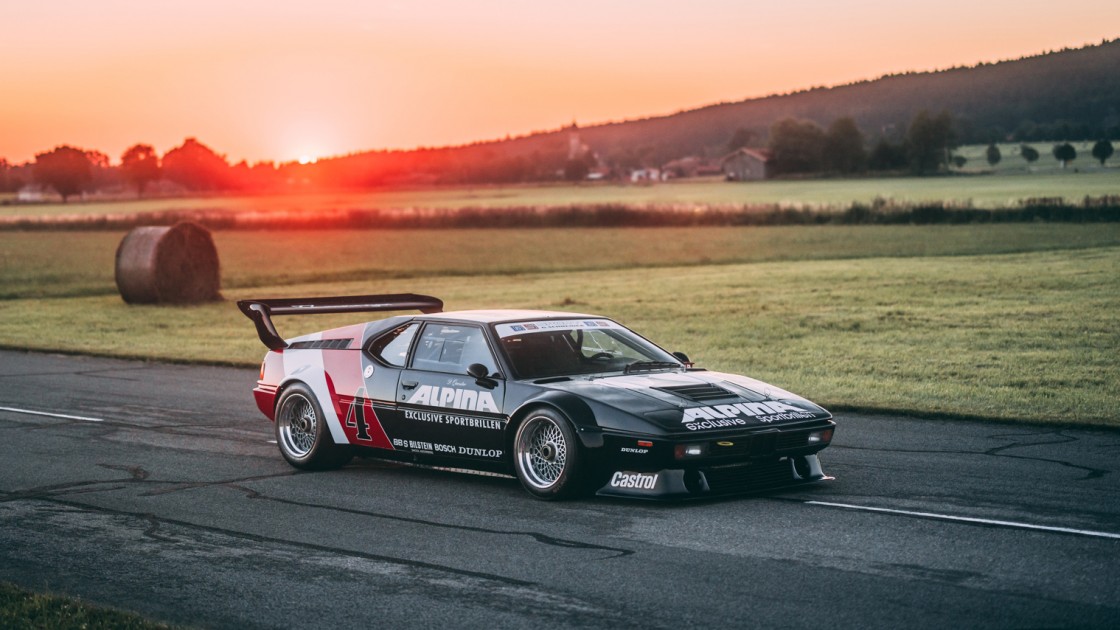The BMW M1 Procar
A proposed Group 5 'Silhouette Formula' for production-based cars triggered the 'M1' program in the mid-1970s. The chief executive of BMW Motorsport, former racing driver Jochen Neerpasch was responsible for initiating this ambitious project, whose goals included taking on rivals Porsche in the World Sportscar Championship and, ultimately, winning at Le Mans. Development was contracted first to Lamborghini and then to Giorgetto Giugiaro's ItalDesign, although almost all cars ended up being finished in Germany.
Giugiaro's compact coupé bodywork in fiberglass was wrapped around a multi-tubular spaceframe chassis, while a twin-overhead-cam, four-valves-per-cylinder, race-developed version of BMW's 3.5-liter six provided the power. The wedge-shaped coachwork proved highly efficient aerodynamically, needing very little in the way of additional spoilers and wings in race configuration.
By 1977, halfway through the development of the M1, FISA altered the rulebook and decided that 400 cars would have to be built for them to allow the homologation for Group 4 to be upgraded to Group 5. Faced with this problem, BMW Motorsport boss, Jochen Neerpasch used his good contact with Max Mosely and after three gin tonics in a then-popular bar in Munich, the pair spawned the idea of putting the five fastest Formula One drivers from practise in a race against a selection of the very best sports and touring car drivers in virtually identical M1 Procars during Grand Prix weekends. Having convinced Bernie Ecclestone and the Formula 1 world of the idea, the BMW board signed off on the budget to have 25 M1 Procars built for the first race at Zolder in 1979. It was a well organized and ingenious marketing exercise for the brand, all the while increasing the number of M1s being built to reach homologation. The Procar Series was a win-win: the spectators got to find out the answers to the perennially pitched question of whether the result is down to the car or the driver, while BMW garnered more marketing for their company and for the M1 production car.
The reality was that what spectators saw on the track and what could be bought for the road were night and day different. Paul Rosche, BMW’s head of engine development, set to work enhancing the M1’s engine, now given the engine code M88/1. Engine power increased drastically from the standard 273 bhp to over 470 bhp, with the engine pulling more than 9,000 rpm. The transmission, while still within the ZF casing had multiple gear ratios and its own oil cooler. The suspension was all new and had adjustable anti-roll bars. The bodywork saw larger, flared and more aggressive wheel arches, and deeper front splitter and a large rear wing for downforce. The cockpit was completely stripped out, with none of the creature comforts of the road cars, only a sturdy roll cage to protect the driver in its single seat. Honed with precision by its engineers, the total weight came in at 1.000 kg, 360 kg less than the road cars.
The Procar M1 race series ran for two years, 1979 and 1980, and its enormously high profile is evident from the series Champions of those two seasons – none other than eventual triple-World Champions Niki Lauda (1975-77-84) in 1979 and Nelson Piquet (1981-83-87) in 1980. After BMW had fulfilled the homologation requirements for the M1 to be accepted into World endurance Championship Group 4 competition, the M1 Procars were campaigned by various teams in those frontline events in addition to other national series. Further to European events the M1 Pro-cars dominated the 1981 IMSA GTO series in the USA.
The M1 Procar we are offering
This M1 ProCar has been sold.
Please do not hesitate to get in contact with us, should you be looking for a similar example.










































































